-
 bitcoin
bitcoin $87959.907984 USD
1.34% -
 ethereum
ethereum $2920.497338 USD
3.04% -
 tether
tether $0.999775 USD
0.00% -
 xrp
xrp $2.237324 USD
8.12% -
 bnb
bnb $860.243768 USD
0.90% -
 solana
solana $138.089498 USD
5.43% -
 usd-coin
usd-coin $0.999807 USD
0.01% -
 tron
tron $0.272801 USD
-1.53% -
 dogecoin
dogecoin $0.150904 USD
2.96% -
 cardano
cardano $0.421635 USD
1.97% -
 hyperliquid
hyperliquid $32.152445 USD
2.23% -
 bitcoin-cash
bitcoin-cash $533.301069 USD
-1.94% -
 chainlink
chainlink $12.953417 USD
2.68% -
 unus-sed-leo
unus-sed-leo $9.535951 USD
0.73% -
 zcash
zcash $521.483386 USD
-2.87%
Is a bullish-enclosing-bearish candlestick pattern with large volume a reversal signal? How can I confirm its validity?
A bullish engulfing pattern after a bearish candle signals potential reversal, especially with high volume, confluence at support, and follow-through confirmation.
Sep 18, 2025 at 12:19 pm
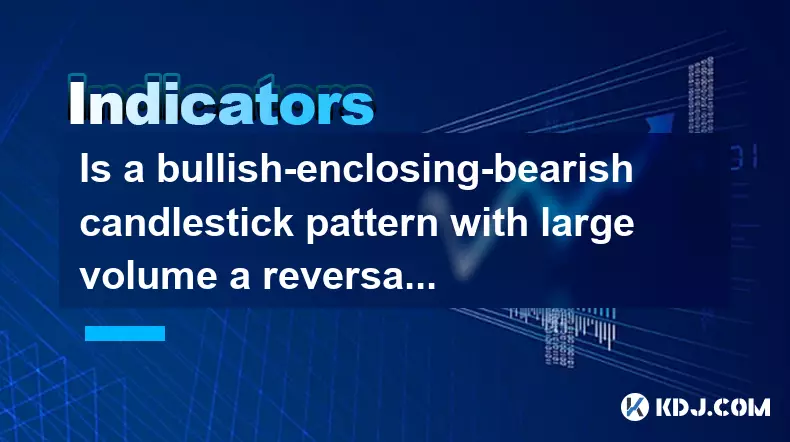
Bullish-Enclosing-Bearish Candlestick Pattern: What It Signifies
1. The bullish-enclosing-bearish pattern, commonly known as a bullish engulfing pattern following a bearish candle, emerges when a large green candle completely engulfs the body of the prior red candle. This formation typically appears at the end of a downtrend and suggests potential exhaustion among sellers. Traders interpret this shift as buyers stepping in aggressively, overpowering previous selling pressure.
2. Volume plays a critical role in validating this setup. A surge in trading volume during the formation of the engulfing candle strengthens the credibility of the reversal signal. High volume reflects strong participation, indicating that institutional or algorithmic players may be accumulating positions. Without elevated volume, the pattern risks being a false breakout driven by retail noise rather than genuine market conviction.
3. Context matters significantly. The same pattern appearing during a minor pullback within a broader downtrend may not carry the same weight as one forming near a well-established support level. Areas where price has previously reversed, or zones aligned with key Fibonacci retracements, enhance the reliability of the signal. Psychological levels, such as round numbers or long-term moving averages, also add confluence.
4. Market structure should align with the pattern’s implications. Lower highs and lower lows preceding the engulfing candle confirm bearish momentum. When this structure breaks—such as with a higher low after the engulfing candle—it reinforces the idea of shifting control from bears to bulls. Ignoring structural context can lead to premature entries based solely on candle shape.
Confirming the Validity of the Signal
1. Wait for closing confirmation. Many traders act impulsively upon seeing the engulfing shape develop mid-candle. However, until the candle closes fully, the pattern remains incomplete. Premature action based on an unfinished candle increases risk exposure unnecessarily. Patience ensures the full data set is available before making decisions.
2. Look for follow-through in the subsequent candles. A strong bullish close immediately after the engulfing candle adds confidence. Ideally, the next one or two candles continue upward with solid bodies and sustained volume. Absence of follow-through, especially if price stalls or drops back into the engulfing candle’s range, suggests weakness and possible failure.
3. Use oscillators like the Relative Strength Index (RSI) or Stochastic to check for divergence. If price makes a new low but the oscillator forms a higher low, it signals weakening downward momentum. This hidden bullish divergence complements the engulfing pattern and supports the reversal thesis. Overbought readings post-engulfing are less concerning if volume confirms strength.
4. Monitor order book dynamics in spot and futures markets. Sudden spikes in bid-side liquidity or large limit orders absorbing sell walls can precede price acceleration. In derivative markets, funding rates turning positive alongside rising open interest during the engulfing candle suggest fresh long positioning, reinforcing the directional bias.
Common Pitfalls and Risk Management
1. Avoid treating every engulfing pattern as a trade setup. In highly volatile crypto markets, fakeouts are frequent. Patterns occurring on low timeframes, such as 5-minute or 15-minute charts, are more prone to manipulation by high-frequency traders or bots. Higher timeframes like 4-hour or daily yield more reliable signals due to broader participation.
2. Always define risk before entering. Placing a stop-loss below the low of the engulfing candle protects against invalidation. If price breaches this level, the reversal narrative collapses, and continuation of the prior trend becomes likely. Position sizing should account for volatility; wider stops require smaller allocations to maintain consistent risk per trade.
3. Beware of news-driven candles. A sudden spike caused by unexpected announcements or exchange outages can create artificial engulfing shapes. These events distort natural supply-demand balance and often result in whipsaws. Checking social sentiment and major news sources helps distinguish organic moves from noise.
4. Never rely on a single indicator or pattern in isolation. Combining candlestick analysis with volume profiles, moving averages, and on-chain metrics creates a multidimensional view. For instance, increased exchange outflows coinciding with a bullish engulfing pattern may indicate accumulation, adding another layer of validation.
Frequently Asked Questions
What timeframe is most reliable for spotting this pattern?The daily and 4-hour timeframes offer the strongest reliability due to reduced noise and greater institutional involvement. Lower timeframes are susceptible to spoofing and erratic behavior, especially in altcoin markets.
Can this pattern appear in sideways markets?Yes, but its significance diminishes. In ranging conditions, engulfing candles often reflect short-term momentum shifts rather than true reversals. They may signal temporary breakouts that quickly revert to the mean, requiring tighter confirmation thresholds.
Does the size of the engulfing candle matter?Absolutely. Larger candles that consume multiple prior bodies demonstrate stronger conviction. A small engulfing candle overlapping only the immediate predecessor lacks the same impact, particularly if volume does not match the visual strength.
How do funding rates affect the interpretation of this pattern?In perpetual futures markets, extremely negative funding rates before the engulfing candle suggest overcrowded shorts. A sharp reversal under these conditions can trigger short squeezes, amplifying upward movement. Positive alignment between price action and derivatives sentiment enhances the probability of sustained follow-through.
Disclaimer:info@kdj.com
The information provided is not trading advice. kdj.com does not assume any responsibility for any investments made based on the information provided in this article. Cryptocurrencies are highly volatile and it is highly recommended that you invest with caution after thorough research!
If you believe that the content used on this website infringes your copyright, please contact us immediately (info@kdj.com) and we will delete it promptly.
- Crypto Crossroads: Bitcoin Price Reacts to Fed Jitters Amidst Shifting Sands
- 2026-02-02 05:05:02
- Justin Sun, Tron, Manipulation Allegations: New Bitcoin Strategy Meets Lingering Controversy
- 2026-02-02 05:05:02
- Bitcoin Eyes $77K as Michael Saylor Reaffirms Unwavering Conviction Amidst Market Swings
- 2026-02-02 05:00:02
- Altcoin Season on the Horizon? ETH, XRP, SOL, ADA Face Potential 184x Gains Amidst Shifting Crypto Landscape
- 2026-02-02 05:00:02
- Bitcoin ETF News: Latest Updates Drive Investment and Market Dynamics
- 2026-02-02 04:50:02
- Rare Royal Mint Coin Error Fetches Over £100: The 'Fried Egg' £1 Coin Phenomenon
- 2026-02-02 04:45:01
Related knowledge
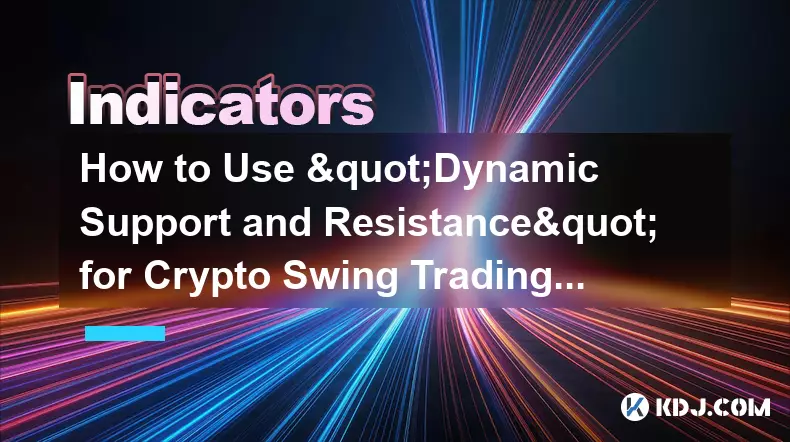
How to Use "Dynamic Support and Resistance" for Crypto Swing Trading? (EMA)
Feb 01,2026 at 12:20am
Understanding Dynamic Support and Resistance in Crypto Markets1. Dynamic support and resistance levels shift over time based on price action and movin...
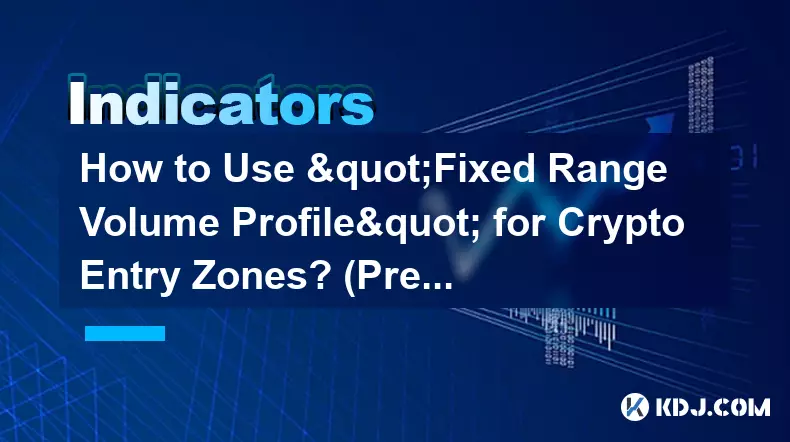
How to Use "Fixed Range Volume Profile" for Crypto Entry Zones? (Precision)
Feb 01,2026 at 10:19pm
Understanding Fixed Range Volume Profile Mechanics1. Fixed Range Volume Profile (FRVP) maps traded volume at specific price levels within a defined ti...
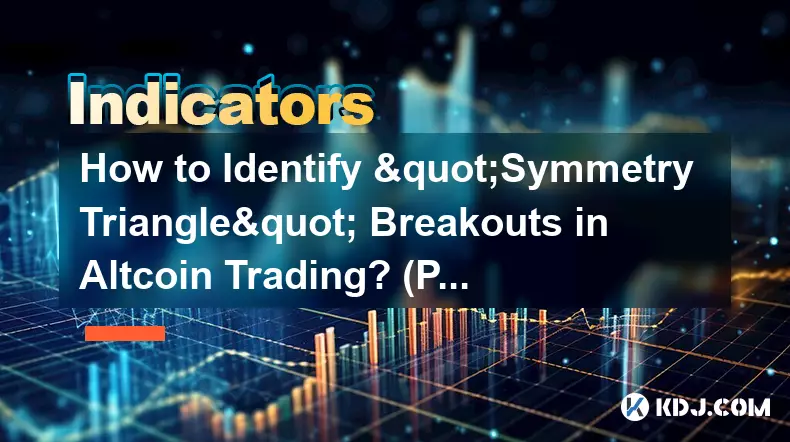
How to Identify "Symmetry Triangle" Breakouts in Altcoin Trading? (Patterns)
Feb 01,2026 at 01:39pm
Symmetry Triangle Formation Mechanics1. A symmetry triangle emerges when price action consolidates between two converging trendlines—one descending an...
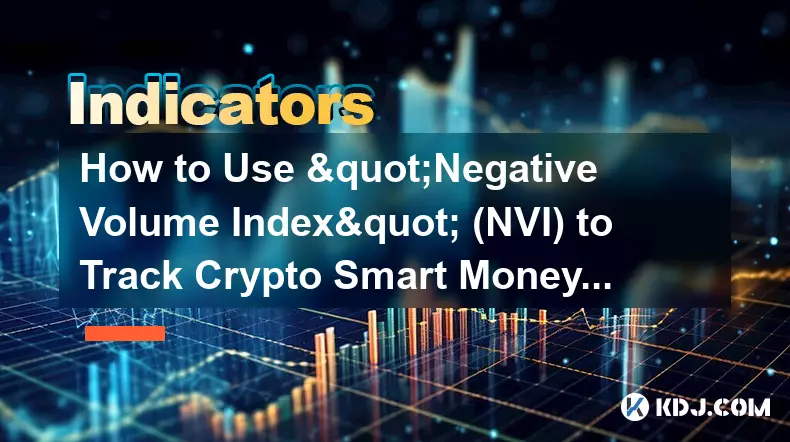
How to Use "Negative Volume Index" (NVI) to Track Crypto Smart Money? (Pro)
Feb 01,2026 at 02:40am
Understanding NVI Mechanics in Crypto Markets1. NVI calculates cumulative price change only on days when trading volume decreases compared to the prio...
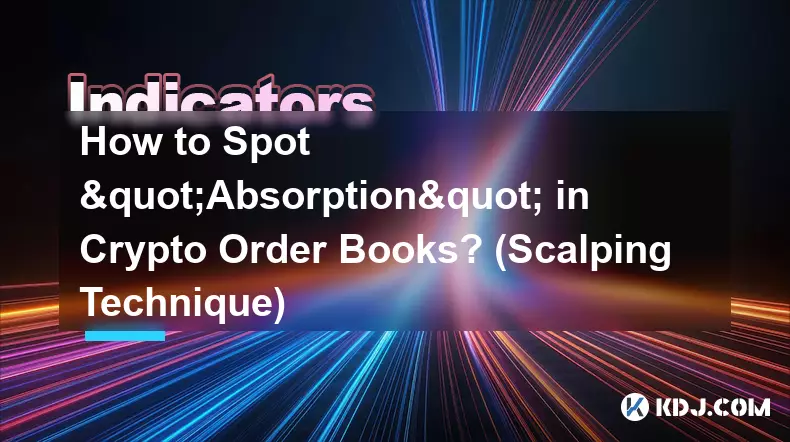
How to Spot "Absorption" in Crypto Order Books? (Scalping Technique)
Feb 01,2026 at 08:39pm
Understanding Absorption Mechanics1. Absorption occurs when large buy or sell orders repeatedly appear and vanish at the same price level without trig...
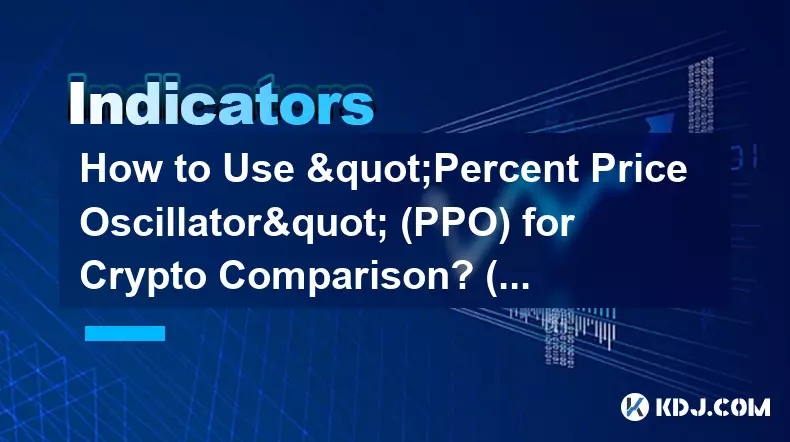
How to Use "Percent Price Oscillator" (PPO) for Crypto Comparison? (Strategy)
Feb 01,2026 at 01:59am
Understanding PPO Mechanics in Volatile Crypto Markets1. The Percent Price Oscillator calculates the difference between two exponential moving average...

How to Use "Dynamic Support and Resistance" for Crypto Swing Trading? (EMA)
Feb 01,2026 at 12:20am
Understanding Dynamic Support and Resistance in Crypto Markets1. Dynamic support and resistance levels shift over time based on price action and movin...

How to Use "Fixed Range Volume Profile" for Crypto Entry Zones? (Precision)
Feb 01,2026 at 10:19pm
Understanding Fixed Range Volume Profile Mechanics1. Fixed Range Volume Profile (FRVP) maps traded volume at specific price levels within a defined ti...

How to Identify "Symmetry Triangle" Breakouts in Altcoin Trading? (Patterns)
Feb 01,2026 at 01:39pm
Symmetry Triangle Formation Mechanics1. A symmetry triangle emerges when price action consolidates between two converging trendlines—one descending an...

How to Use "Negative Volume Index" (NVI) to Track Crypto Smart Money? (Pro)
Feb 01,2026 at 02:40am
Understanding NVI Mechanics in Crypto Markets1. NVI calculates cumulative price change only on days when trading volume decreases compared to the prio...

How to Spot "Absorption" in Crypto Order Books? (Scalping Technique)
Feb 01,2026 at 08:39pm
Understanding Absorption Mechanics1. Absorption occurs when large buy or sell orders repeatedly appear and vanish at the same price level without trig...

How to Use "Percent Price Oscillator" (PPO) for Crypto Comparison? (Strategy)
Feb 01,2026 at 01:59am
Understanding PPO Mechanics in Volatile Crypto Markets1. The Percent Price Oscillator calculates the difference between two exponential moving average...
See all articles










































































